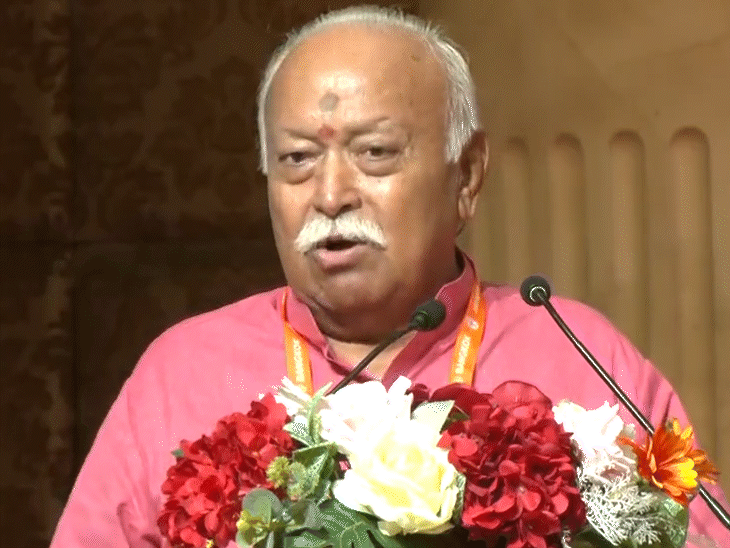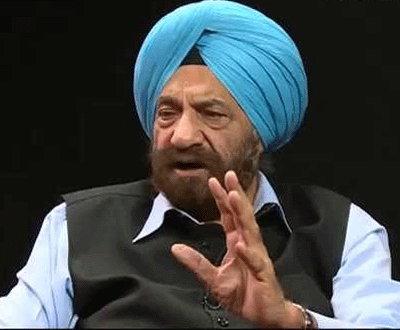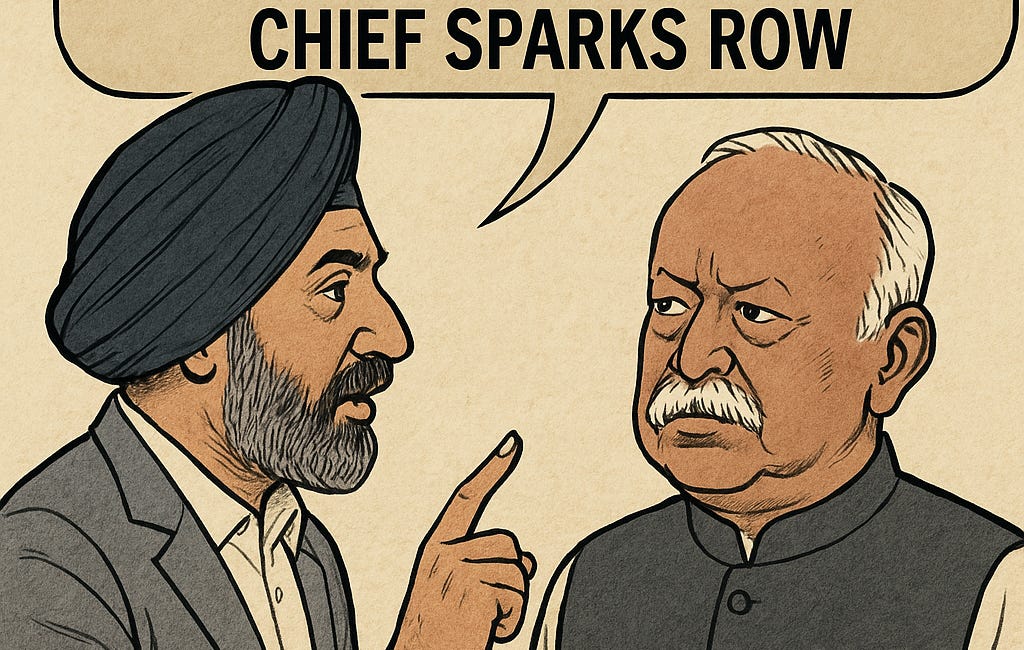RSS Must Categorically Declare: "Sikhs Constitute a Separate Religion"
Amid past assurances and ongoing ambiguity, a clear reaffirmation from the RSS is essential—for Sikh sensibilities, constitutional clarity, and Punjab’s stability.
Author credentials:
Karan Bir Singh Sidhu, IAS (Retd.), served for over four decades in public service, including as Deputy Commissioner of Amritsar (1992–96), and retired as Special Chief Secretary, Punjab. He writes on the intersection of Sikh sensibilities, Sikh principles, history, and the RSS’s broader Hindutva agenda.
Author’s Note:
I had a detailed telephonic conversation with Sardar Tarlochan Singh, former Chairman of the National Commission for Minorities and Rajya Sabha MP, from my camp in Austin, Texas, USA, where I am on a short visit. I am grateful to him for having thrown light on many historical facts that inform the perspective in this article.
A Recent Controversy Rekindles an Old Question
When RSS Sarsanghchalak Mohan Bhagwat himself presided over a recent RSS-affiliated “Vice-Chancellors’ Conference” in Kerala, it lent weight and prominence to the proceedings. Yet, it was a remark by the Vice-Chancellor of Amritsar-based Guru Nanak Dev University—proposing a research Chair to study “Vedic resonances” in Sri Guru Granth Sahib—that sparked widespread outrage. While this incident has drawn sharp criticism in Punjab and beyond, it should be seen only as a trigger for a far more consequential issue: the urgent need for the RSS to unequivocally declare that Sikhs constitute a separate religion—not merely from a narrow legal standpoint, but in every substantive sense.
This is not about one academic’s statement or a fleeting controversy. It is about addressing a long-standing ambiguity in the RSS’s position that continues to unsettle Sikh sensibilities. For a community that has irrevocably thrown its lot with India, and for a sensitive border state like Punjab, such clarity is vital—not only for social harmony but also for national stability.
A History of Mixed Signals
The RSS’s approach to Sikh identity has oscillated over decades. Historically, its founding ideologue M. S. Golwalkar subsumed Sikhs within the Hindu social order. In 2000, then RSS Chief K. S. Sudarshan described Sikhism as “a sect of Hinduism” and the Khalsa as “created to defend Hindus from Mughal tyranny,” provoking an uproar among Sikh institutions.
Yet, in January 2001, after sustained protests, RSS spokesman M. G. Vaidya handed Sardar Tarlochan Singh, then Vice-Chairman of the National Commission for Minorities (NCM), a written note explicitly stating: “Sikhism is a separate religion with a distinct ideology.”
Further, in August 2005, VHP President Ashok Singhal—a close RSS ally—issued a letter declaring: “Sikhism is a separate religion.” Tarlochan Singh publicised this letter, framing it as a categorical acknowledgement by the Sangh Parivar.
These interventions, driven by Tarlochan Singh’s persistence, offered reassurance at the time. But they were isolated affirmations, never embedded in the RSS’s core narrative. Instead, more recent statements—such as Mohan Bhagwat’s remark that “all Bharatiyas are Hindus”—have reignited old anxieties and drawn sharp rebuttals from Sikh leadership, including the SGPC and even the Akal Takht, which in 2019 called for a ban on RSS activities seen as threatening Sikh distinctiveness.
Statutory and Constitutional Clarity is Beyond Dispute
If there is any doubt, India’s own legal and constitutional framework decisively establishes Sikhism’s separate identity:
The Anand Marriage Act (1909, amended 2012): This Act allows Sikh marriages to be registered independently of the Hindu Marriage Act. This reform, piloted after years of advocacy by Tarlochan Singh, was a legislative assertion of Sikhism’s distinct status.
The National Commission for Minorities Act (1992): Sikhs are explicitly listed as one of India’s recognised religious minorities, alongside Muslims, Christians, Buddhists, Jains, and Parsis.
Article 25 Explanation (Indian Constitution): Although historically contentious for grouping Sikhs under Hindu personal law in certain contexts, subsequent legislation—including the Anand Marriage Act amendment—has reinforced Sikhism’s distinct legal and institutional identity.
Sikhism is not only a unique spiritual tradition rooted in Guru Nanak’s teachings but also enjoys clear statutory and constitutional recognition as an independent religion.
Why RSS Must Speak Clearly—Now
In light of this clarity in law and history, the RSS’s ambiguity is unnecessary and counterproductive. What purpose is served by equivocal statements, when even its own leaders have acknowledged Sikhism’s separate status in writing?
With the BJP—ideologically aligned with the RSS—no longer allied to any faction of the Shiromani Akali Dal, and given Punjab’s sensitivities as a border state, a categorical reaffirmation by the RSS is now essential.
The path forward is evident: RSS Sarsanghchalak, Mohan Bhagwat should visit Amritsar, pay obeisance at Sri Harmandir Sahib (Golden Temple), and publicly reaffirm that Sikhs constitute a separate religion—as earlier recognised by M. G. Vaidya in 2001 and Ashok Singhal in 2005. Such a gesture would send a clear signal of respect, strengthen Hindu-Sikh ties, and reinforce India’s plural ethos.
Dialogue, Not Distance
This is not merely the RSS’s responsibility. Sikh leaders and institutions must also embrace constructive dialogue—whether with the RSS or in broader interfaith platforms—armed with historical knowledge, legal clarity, and Gurbani’s spirit of Sarbat da Bhala (welfare of all).
At the same time, bureaucrats, academicians, and technocrats—especially practising, turbaned Sikhs—must be cautious. Public remarks that even remotely appear to diminish the sanctity of Sri Guru Granth Sahib Ji risk igniting divisive debates that create more heat than light. Career advancement should not come at the cost of deep sensitivities.
A Shared Responsibility for Stability and Harmony
For the RSS, categorical clarity is not merely a gesture towards Sikhs; it is vital for consolidating trust and stabilising Punjab. For Sikhs, confident engagement without fear or defensiveness reaffirms their place as a vibrant, self-assured faith community that has historically defended India’s unity and sovereignty.
Punjab thrives on equilibrium. Recognising Sikhism’s distinct identity is thus not divisive—it is integral to India’s pluralism and national cohesion.
Looking Forward: Building Harmony Anchored in Respect
Sri Guru Granth Sahib Ji is not merely scripture; it is the very embodiment of the living Guru, the spiritual sovereign of Sikhism. To blur this identity, intentionally or inadvertently, is to invite unnecessary discord.
In this context, it is worth acknowledging the steadfast efforts of Sardar Tarlochan Singh, whose interventions over the years—whether in securing the Anand Marriage Act amendment or eliciting earlier categorical statements from RSS and VHP leaders—have been instrumental in keeping this issue anchored in both historical fact and constitutional clarity.
The ball is now squarely in the RSS headquarters at Nagpur, and while their silence cannot be misquoted, it surely can be misconstrued. Hence, an affirmative declaration is both urgent and necessary.
If the RSS unequivocally reaffirms Sikhism’s distinctiveness, it would soothe current anxieties and reflect the inclusive vision of Guru Nanak’s Sarbat da Bhala alongside the ideal of Vasudhaiva Kutumbakam—the world as one family. Such clarity would heal old fissures, foster interfaith confidence, and turn this moment into a milestone of mutual respect and peaceful coexistence, vital for Punjab’s stability and India’s plural future.
Dr Mohan Bhagwat's Landmark Address at the World Hindu Congress in Thailand
The World Hindu Congress at Bangkok, Thailand






Why do the Sikhs need a certificate from any organisation, that too, from one like the RSS. Bhagwat said all Indians are Hindus. What about Hindus living abroad as foreign citizens? Are they not Hindus ? One should realise that the statements issued by RSS are totally illogical and irrational. On the one hand they talk about Akhand Bharat and on the other they want every Indian to be recognised as a Hindu. In Akhand Bharat the core Hindus will be in minority. I just want to highlight that we Sikhs and all rational Indians for that matter should ignore what the RSS says especially in respect of Sikhs. We don’t need a certificate from them.
Purely from sociological definition of religion, Sikhs are distinct and will remain so as long as they adhere to the Sikh institutions namely, Sri Guru Granth Sahib, the Gurwara (sangat), Sewa, common kitchen (langar/pangat) and casteless commune. As Guru Gobind Singh ordained:
ਜਬ ਲਗ ਖਾਲਸਾ ਰਹੈ ਨਿਆਰਾ। ਤਬ ਲੱਗ ਤੇਜ ਦੀਉ ਮੈਂ ਸਾਰਾ।
Dear Mr. Sidhu,
Thank you for your thought-provoking article, "A Recent Controversy Rekindles an Old Question." Your call for the RSS to make an unequivocal declaration about Sikhism's separate identity is a timely and important one, and I appreciate the clarity and legal context you've provided.
Your piece, however, prompts me to consider a deeper set of questions that go beyond the legal and political. I'd like to ask you and other readers to consider the historical and social factors that have shaped Sikh identity, particularly as they relate to the present-day complexities.
* The Purpose of the Khalsa: It is a widely held belief that Guru Gobind Singh created the Khalsa to defend the community against a specific threat. He urged Hindu families to provide their eldest sons to join this army. Given this, could the Khalsa's original purpose have been more about creating a martial identity for defense rather than a completely new religious identity? Once that specific threat subsided with the advent of British rule, why did the separation continue to solidify?
* The Role of "Non-Amritdhari" Sikhs: Today, a large population of people follow the teachings of the Guru Granth Sahib but do not adhere to the symbols of the Khalsa. Many of their children are, in some cases, moving towards Hindu temples. Doesn't this ongoing social evolution on the ground provide a basis for the very claims that you are asking the RSS to renounce? It points to a shared heritage and an identity that is still evolving.
Finally, and perhaps most crucially, there is the complex issue of reservation. As you know, certain communities within Sikhism enjoy the benefits of reservation. This is contingent on them being recognized under the broader Scheduled Caste category, a recognition that is legally tied to a person's religion being Hinduism, Sikhism, or Buddhism. This is the very reason why the central government has consistently resisted extending reservation benefits to converts to Christianity and Islam.
Therefore, my question is this: If Sikhism is treated as an entirely separate and exclusionary religion, as is being advocated, would it not create a paradox for these communities? Would a definitive separation not raise the uncomfortable question of whether they should lose their reservation benefits, an issue that is a matter of survival for many? This is a discussion that must be debated and decided among the Sikh community itself before taking such an exclusionary stance.
It's my belief that Guru Gobind Singh's intention was not necessarily to create a separate religion, but a movement that evolved over time. While the legal and political declarations you've highlighted are crucial for the present, understanding this historical evolution and its real-world consequences is, in my view, essential for any lasting resolution.
I would be grateful for your thoughts on these points.
Thank you again for your valuable work.
Sincerely,
Prem K Gera